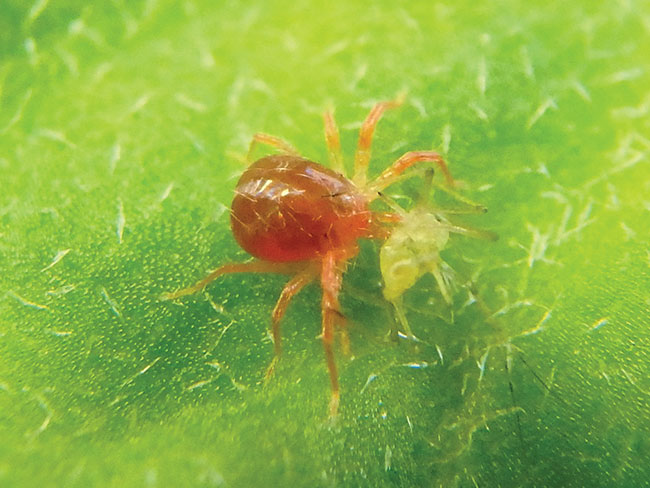
Features
AG Women
Features
Pest Management
Sustainability
Research and innovation Q&A: Biological basics
April 10, 2023 By Alex Barnard
 The success of Anystis is already evident among Canadian growers who were eager to be involved with trials over the past year. Photo courtesy of Taro Saito.
The success of Anystis is already evident among Canadian growers who were eager to be involved with trials over the past year. Photo courtesy of Taro Saito. Biologicals are a hot topic these days, with several companies releasing new or updated bio products onto the market in recent years. But what are these products and how are they used? Rose Buitenhuis, senior research scientist, biological control, at Vineland Research and Innovation Centre in Vineland, Ont., recently spoke with Fruit & Vegetable on this topic. She breaks down what biologicals are, the types of biological products being researched at Vineland, as well as what to know or consider when using a biological product.
Listen to the full interview here.
Let’s demystify – what are biologicals?
There’s a lot of products that have bio in the name and they’re all related. It’s very hard to classify them because there’s a lot of overlap. The reason why we named our program [at Vineland] biological crop protection is because there’s a lot of bio products.
Bioprotectants basically encompass everything – biological pesticides, bio-pesticides, bio-stimulants. When you go into more detail, biological control, or biocontrol, is really a name for a method of controlling pests and diseases with other organisms. So, these are predators, parasitoids and pathogens – the microbials – that will control pests, diseases, and also weeds. Then there’s the bio-pesticides: those are pest management agents and chemicals derived from natural sources.
Microbials are also sometimes called bio-pesticides. So, you have the microbial pesticides, but you also have natural compounds like semiochemicals, which are a kind of message-bearing chemical; these could be pheromones, which are used in monitoring traps to disrupt the mating of insect pests to help reduce the damage.
Then there’s the non-conventional pest control products, which are also part of bio-pesticides. This includes things like garlic powder, vinegar, plant extracts and oils, mineral salts – all that kind of products.
Last but not least, there’s the biostimulants, which could be microbes, but could also be a compound that stimulates the plant to do something. So, if you put it directly on an insect or disease, it will not do anything. It uses the plant’s own mechanisms to make the plant grow better.
Are bio products broadly usable across crops, or are they more particular in terms of how they interact with specific crops?
I think the words I say most when talking about this are, “It depends.” And it really does – some bio-products have a very broad spectrum of crops they can protect; others are more situation-specific.
Products that are on the market are really optimized for specific uses and you can find those uses on the label. If you are looking for a product that does something, that’s where you would look for information.
Now, the research part is, of course, interesting, if you’re starting to look at what else it does and how it interacts with your production system, with the biocontrol you may be doing, with the fertilizer you add. Growing plants, you have to consider a lot of different factors to optimize the system. So, knowing what these products do and how they fit into your production system is, I think, really important.
As an example, in biological insect control there are parasitoids that attack aphids. You may want to use another predator to control a different pest, but you have to know how the parasitoid and this different predator actually interact with each other – because they may eat each other. The predator may not discriminate between the prey that you’re using them for and the other biologicals you have.
It’s a complex system.
Exactly. Especially if you try to integrate the use of chemical pesticides and biological control.
Even products that you think might never interact with each other, like a systemic insecticide and a biological control – through the plant and through the pest, they are connected. So, you would have to consider the effects on your overall pest control program.
Are biological products usable in an organic system?
Logically, you would say it’s biological, so it should be organic as well. However, organic certification is something that’s not given to all biological products based on how they’re formulated.
The insects – the predators and parasitoids – those can be used in organic systems. Some of the bio-pesticides may be formulated in a way that’s not certified organic.
So, always look at the label to know if it’s certified organic or not.
Print this page